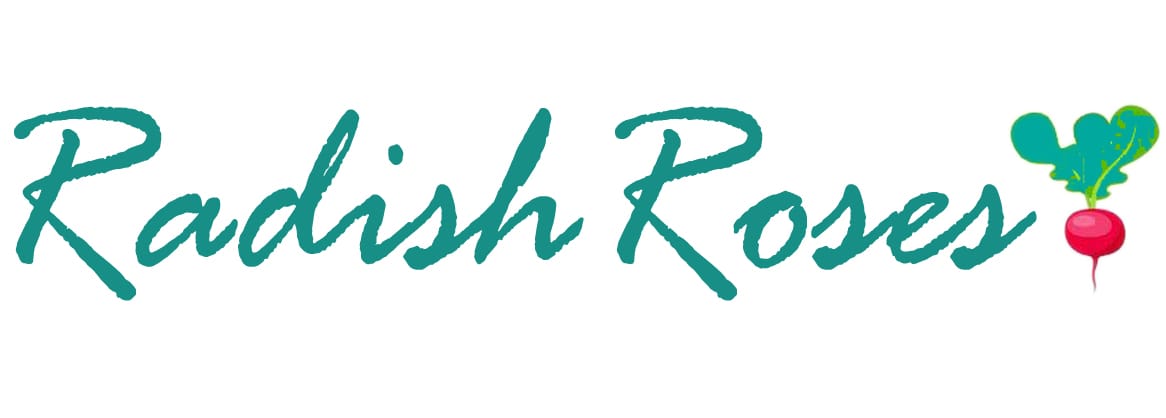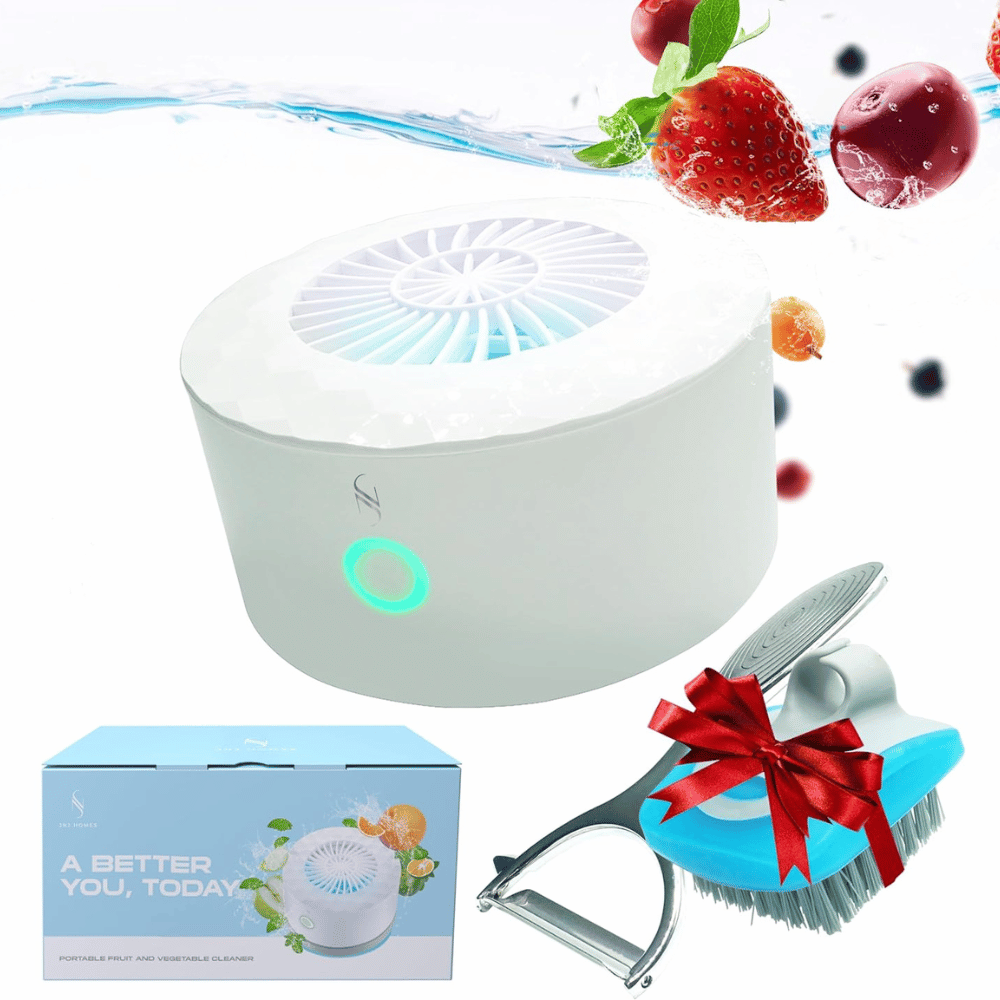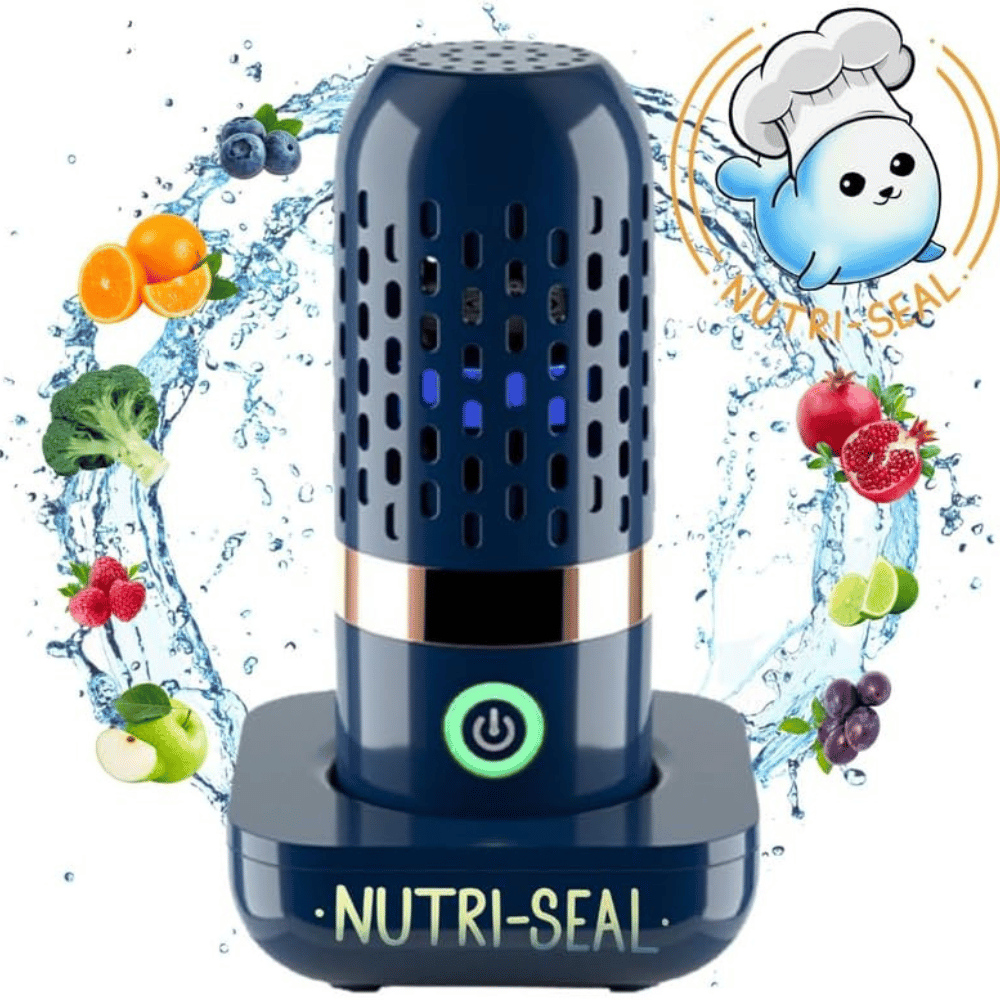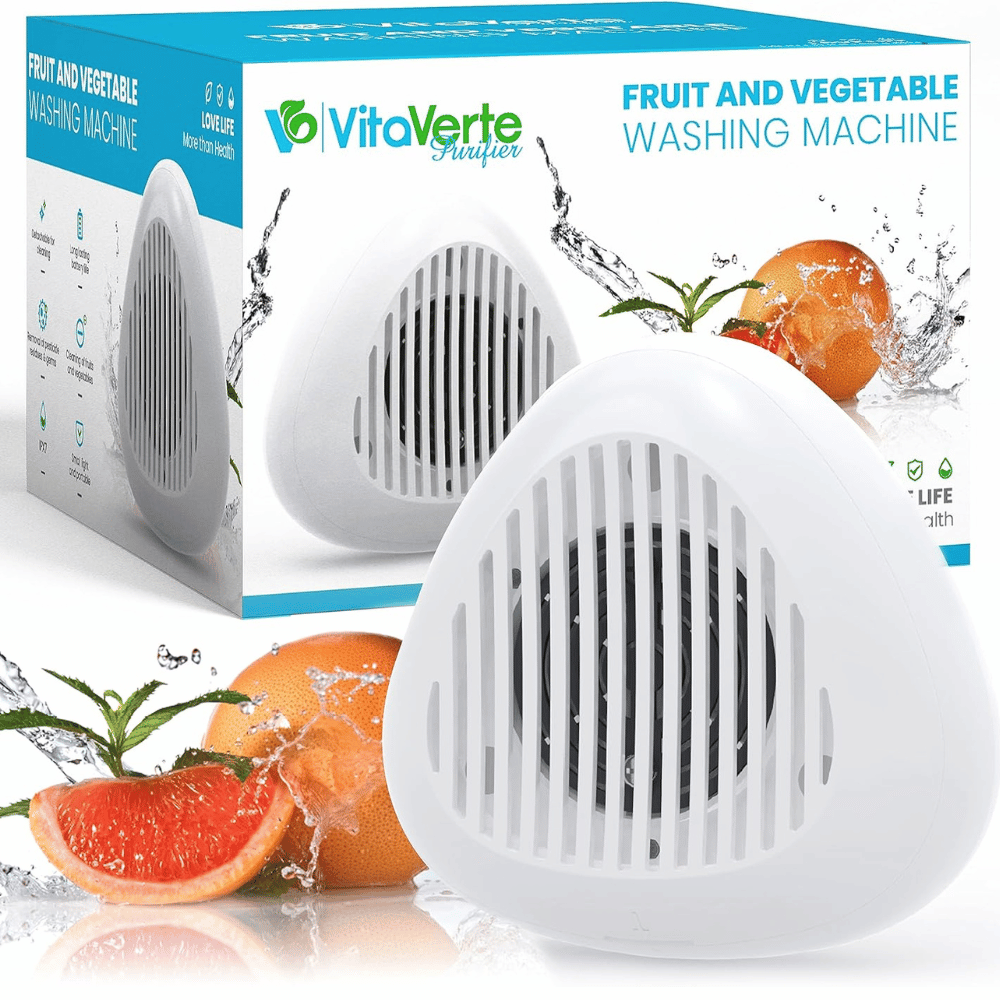Are You Serving Bacteria With Your Beets?
How a Produce Washing Machine can make washing your fresh fruits and vegetables easy and effective!
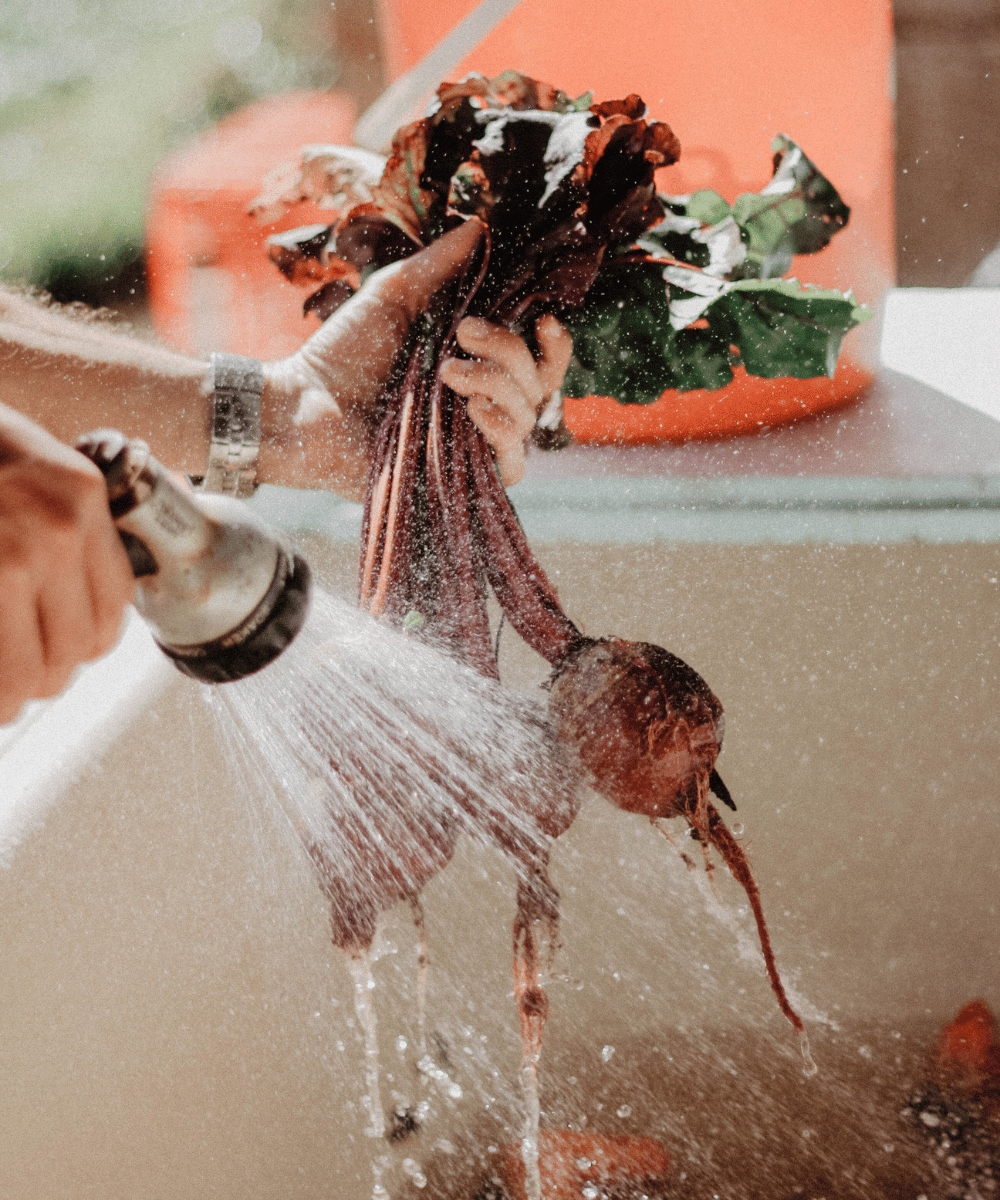
Make washing your fresh produce easier than ever!
Today we’re discussing one of the latest kitchen trends: a washing machine specifically designed just for washing veggies! We'll explore the importance of washing your fresh produce. Benefits, features, and which is our pick for the best washer. Get ready to discover an effortless way to soak and rinse your leafy greens in a jiffy!
What is A Produce Washing Machine and Why You Need One
Are you tired of spending time and effort washing vegetables by hand? Wondering if you are getting them clean enough?
Say hello to the must-have kitchen gadget that will make your life a lot easier: the vegetable washing machine. This clever multifunctional washer is designed to quickly and efficiently clean apples, strawberries, leafy vegetables, and root vegetables such as potatoes and carrots.
They are suitable for any fruit or vegetable, saving you time and effort. Not only does it wash debris from fruits and veggies , but it can also remove pesticides and harmful bacteria, making them safer to consume.
Plus, investing in a vegetable washing machine means you'll be doing your bit for the environment by reducing water use. This kitchen gadget is a game-changer and a fun addition to your wish list!
How Does It Work?
The electric fresh produce washing machine works on the simple yet effective process of hydrolysis. There are two main ways these fruit and vegetable washers use electrolysis to clean your produce in an efficient way. Both involve using electrolysis to break apart water molecules, a method called hydrolysis.
- Ionized Water Technology: This is the most common cleaning process used by vegetable washers. The unit uses hydrolysis to split water molecules, releasing negative ions that bond with dirt and other impurities, lifting them from the surface of your produce. This gentle washing not only cleans your veggies but also removes pesticides and harmful bacteria.
- Hypochlorous Acid Technology: This method uses a combination of salt, water, and electricity to create hypochlorous acid which is an effective antimicrobial agent. The mildly acidic solution created by this process can kill harmful bacteria on your produce without leaving any residue.
Our Pick For Best Produce Washing Machine
Fruit and Vegetable Washing Machine
-Uses electrolysis to break apart water and salt ions to create hypochlorous acid, a natural cleaning agent that has been proven up to 99% effective in eliminating many bacteria, viruses, and fungi
-Anti-skid wireless charging dock
-Small business
Honorable Mention
Nutri-Seal™ Fruit and Vegetable Cleaner
-Turns water molecules into charged H+ and OH- ions that bind impurities
-Made from BPA-free, ABS plastic and stainless steel
-Includes USB cable and non-slip charging base
Vita-Verte Fruit & Vegetable Cleaner Machine
-Cleans with charged OH- ions from hydrolyzed water
-Waterproof and easy to clean
-USB charging cable with magnetic connection
Tips on how to get the best from your veggie washer
Investing in a veggie washer is a great addition to your kitchen, but like any other tool, it requires maintenance to keep running smoothly.
Here are some tips on how to maintain your veggie washer: First, make sure to clean out the filter regularly to prevent buildup and blockage. Second, avoid cleaning too many fruit and vegetable items at once, as this can overload the device and be less effective.
Additionally, avoid using hot water to clean delicate fruits or veggies as this could damage them or cause them to wilt.
Finally, after use, make sure to rinse out the interior and let it dry completely before storing it away. By following these simple steps, your fruit and vegetable washing machine will last for years and keep your produce fresh and clean!
Questions About Produce Washing Machines (FAQs)
Q: Does washing vegetables remove all pesticides?
Washing your vegetables can certainly help reduce the amount of pesticides present, but it's not 100% effective.
The Environmental Protection Agency (EPA) states that washing your fruit and vegetable items under running water can remove some types of pesticide residue. In fact, they even encourage people to "wash produce before consuming". However, there are several factors you should consider when washing your food.
First, traditional cleaning such as scrubbing with a brush may only remove between 10-20% of the pesticide residue on fruit and vegetable items. The type and intensity of washing required depends on how much pesticide has been used during production and harvesting; for stronger pesticides, an intense scrubbing or soaking may be necessary to effectively reduce its residue content.
Q: Is homegrown produce healthier?
Absolutely! Homegrown produce is usually fresher, more nutritious, and contains fewer pesticides than store-bought produce.
Freshness: Homegrown produce is usually picked the same day it's purchased or eaten, while store-bought produce often spends weeks in transit. This can lead to a decrease in nutrients that are found naturally in fruit and vegetable foods over time. Additionally, freshly harvested fruits and vegetables contain higher concentrations of vitamins and minerals than overripe or withered grocery store varieties.
Nutrition: Since homegrown produce doesn't have to be shipped from far away locations, it’s typically richer in nutrition since there’s less time between when it’s picked and when you consume it. Fruits might taste sweeter if grown closer because they get better soil composition as well as more sunlight which increases their sugar content enabling them to develop better flavor for consumers to enjoy!
Pesticides: Many commercially produced fruits and vegetables come with high levels of pesticides compared to homegrown. When buying from small-scale farmers such as those at your local farmer's markets you know exactly where the food has been sourced from giving you peace of mind that harmful chemicals aren't present on your food supply ensuring you eat fresh clean foods with all necessary vitamins & minerals intact! Plus, organic methods may also reduce environmental damage from large agriculture operations providing an additional layer of protection for our environment!
Overall, homegrown produce has its advantages over commercial grocery stores produce when it comes to health benefits.
It has greater nutrient density since it's fresher so there are no worries about depleted nutritional value due to the transit time associated with transportation distances; plus most smaller-scale farmers use organic methods reducing potential health risks associated with pesticide exposure making home-grown food a healthy choice!
Q: How important is it to wash vegetables?
It is extremely important to wash vegetables before preparing and eating them.
Vegetables come in contact with all kinds of dirt, bacteria, insects, and chemicals while growing and during the harvesting process. These contaminants can lead to foodborne illnesses if they are not removed properly.
Additionally, research has shown that some chemicals used in fertilizers or pesticides will remain on the surface of vegetables after harvesting and can adversely affect our health if ingested.
The best way to remove these unwanted materials from the surfaces of veggies is to thoroughly clean them using running water. First, we should rinse off any visible debris such as soil from veggies like carrots or potatoes with a produce brush (if we’re concerned about scratches).
Then, we should fill a large bowl with cold water (preferably filtered) and submerge all vegetables into it so that any small particles adhering to them can be washed away easily. For leafy greens like spinach, swish around in a bowl of cool water for about 30 seconds before rinsing off with a sprayer attachment on your sink so no debris remains behind.
Finally, drain the excess water by patting dry individually with paper towels or using salad spinners for larger salads/veggies and you’re good to go!
Washing fruits & veggies adds an extra step but it is well worth it; keeping yourself safe from food-borne illnesses by taking this precautionary measure!
You want to have the healthiest veggies, maintain a germ-free kitchen, and save time and money when cleaning vegetables, so investing in a fruit and vegetable washing machine is the way to go.
With so many different types available at varying prices, there is sure to be one that fits your needs. Take a closer look at our recommendations by clicking the link below the pictures, and compare options for yourself.
Ready to get started on a better method of cleaning fruits and veggies? Go buy a fruit and vegetable washing machine today and enjoy it for years of healthy eating!
